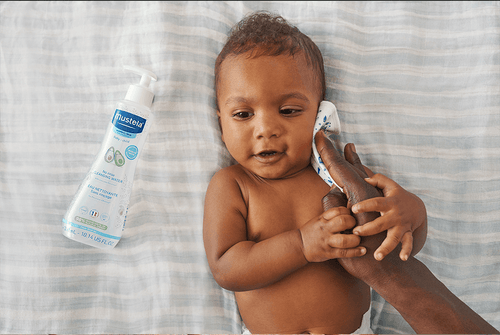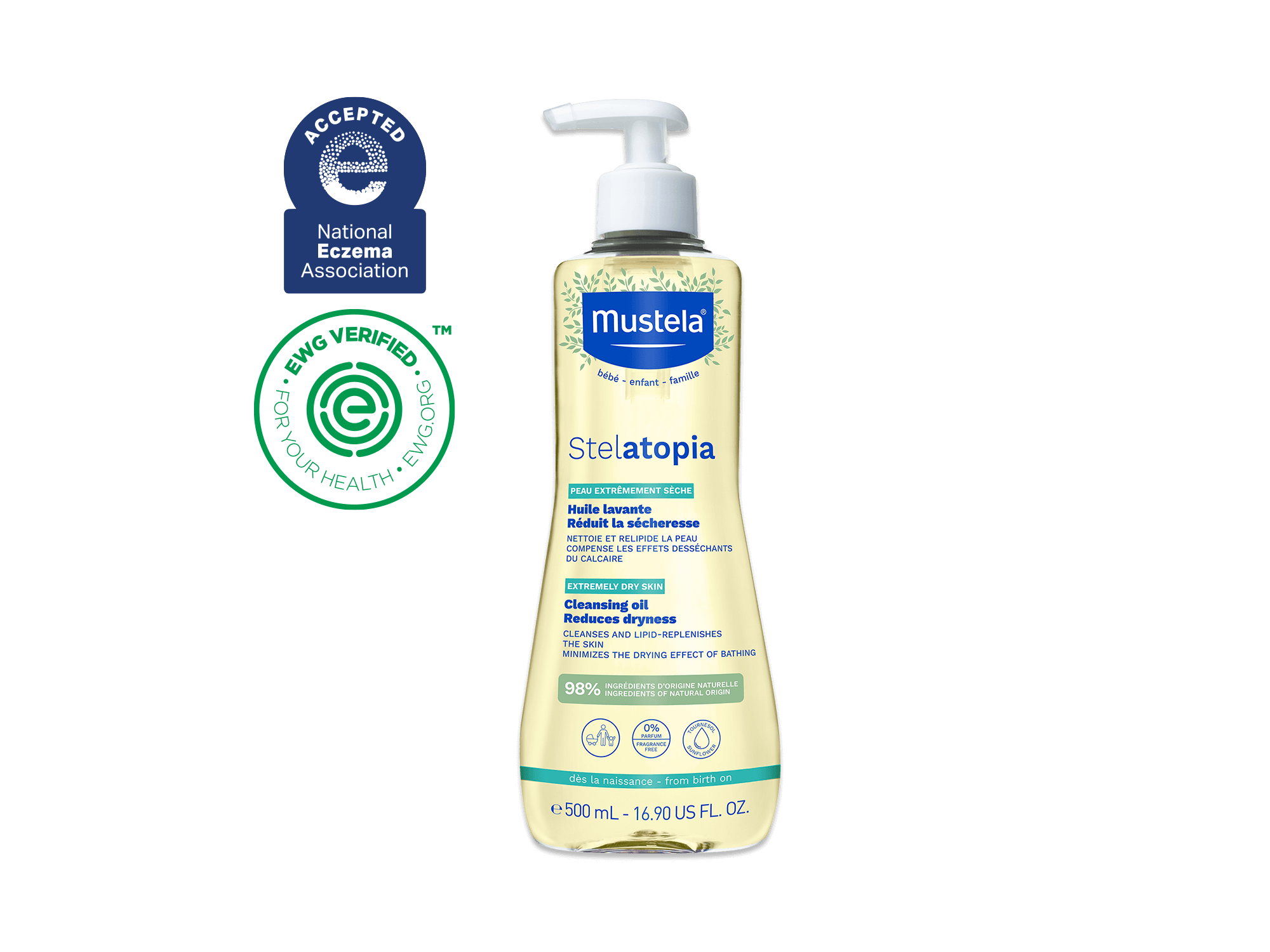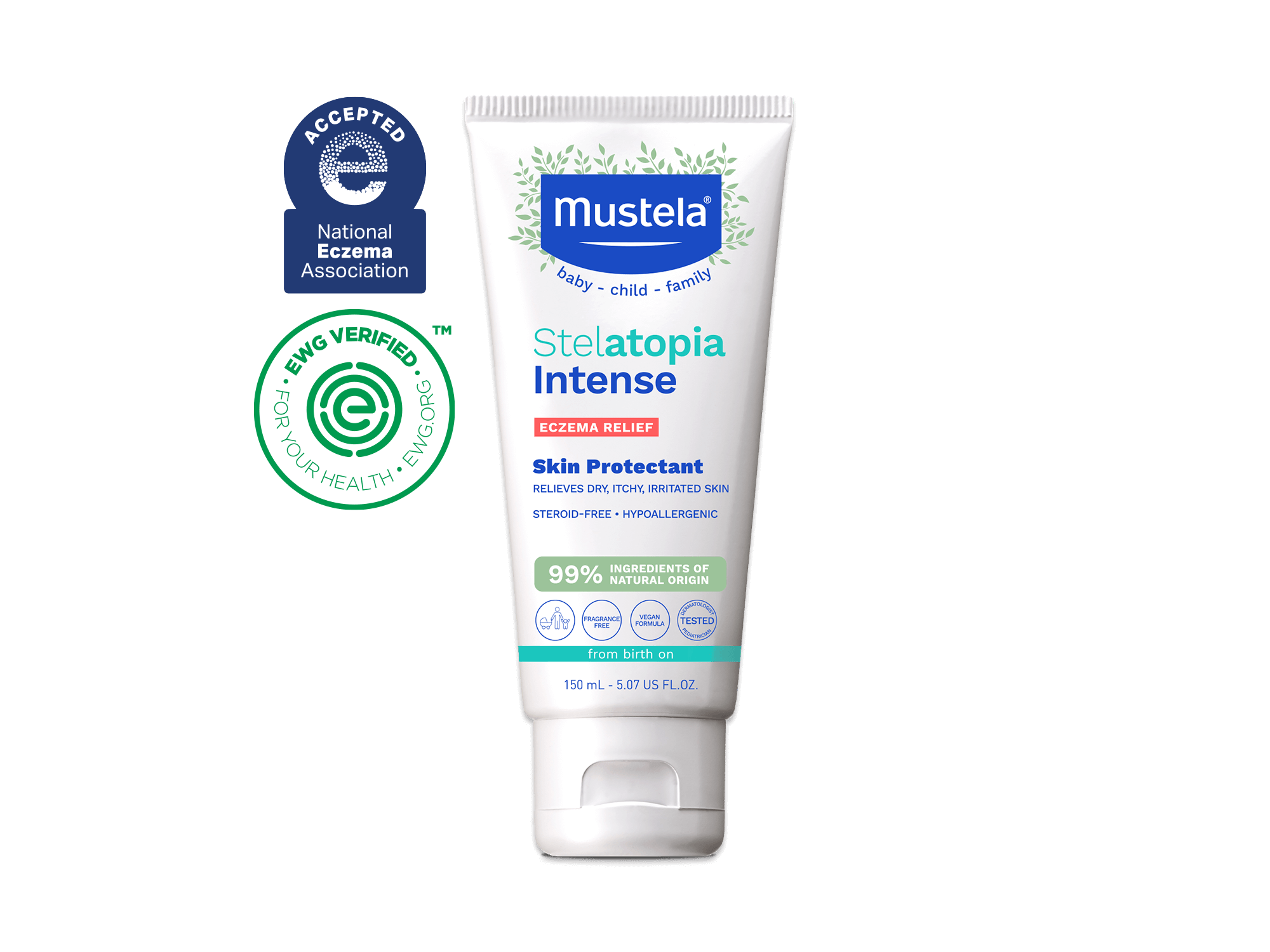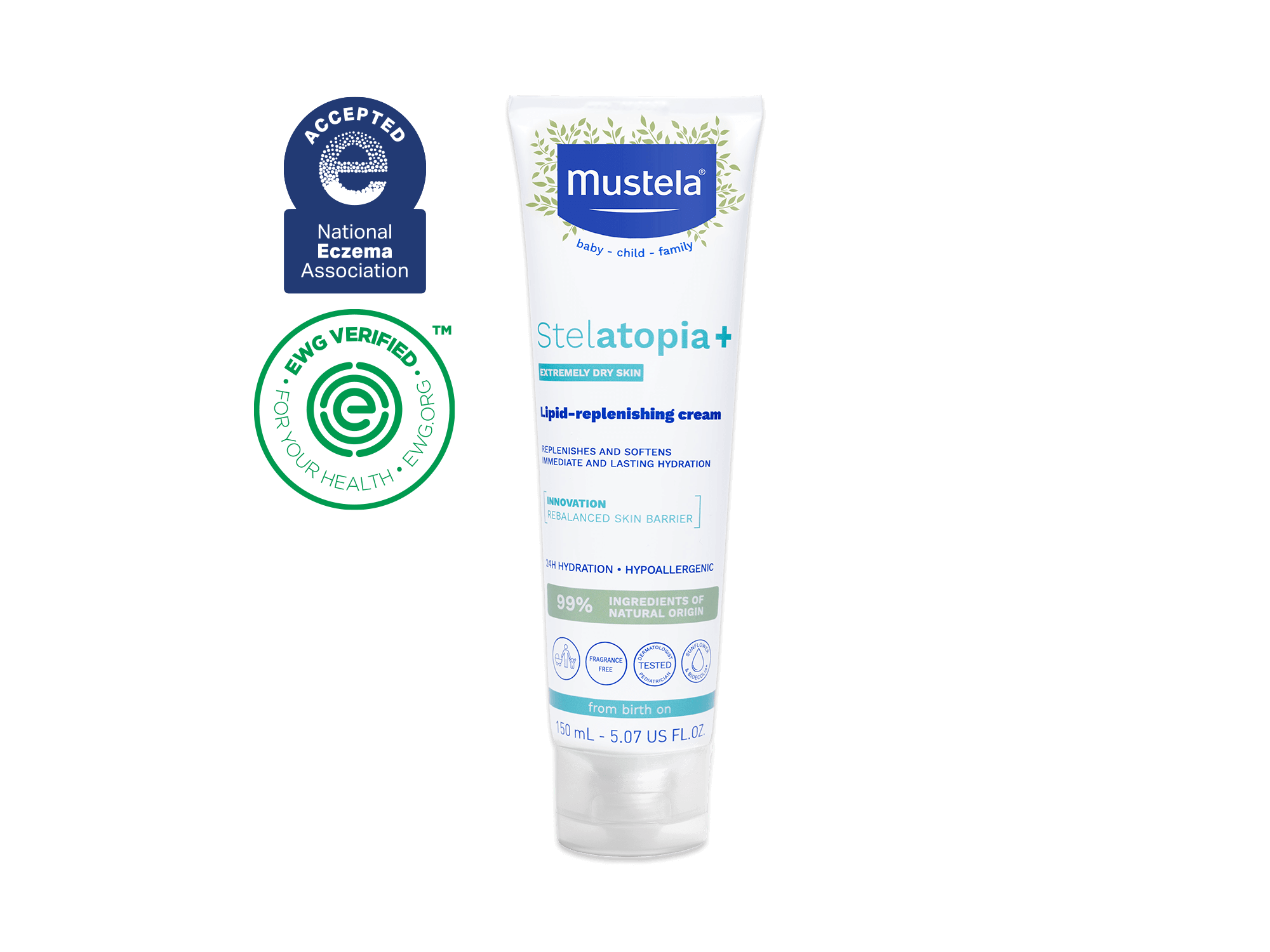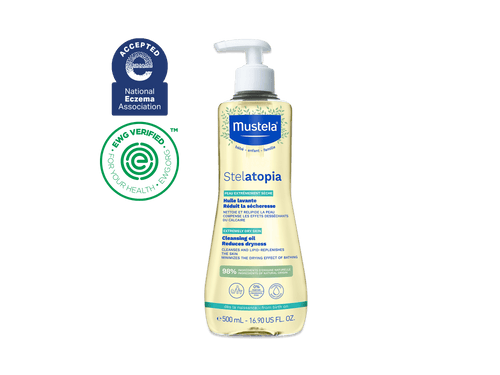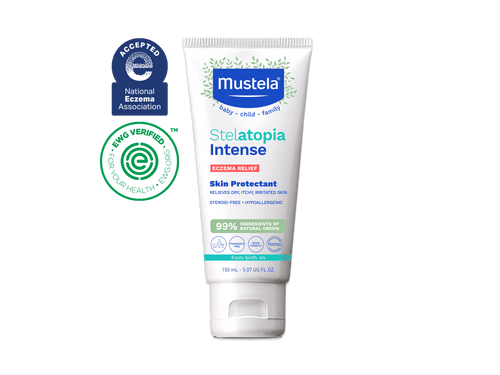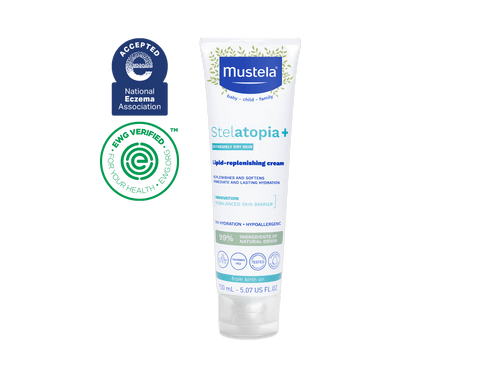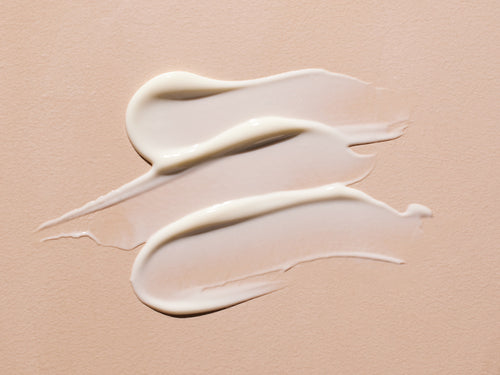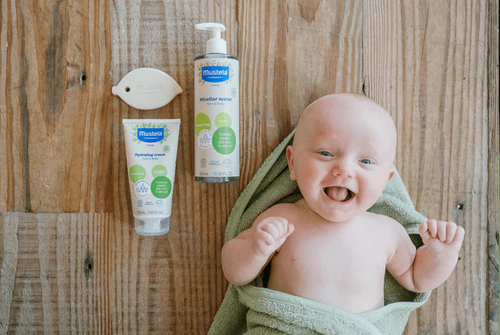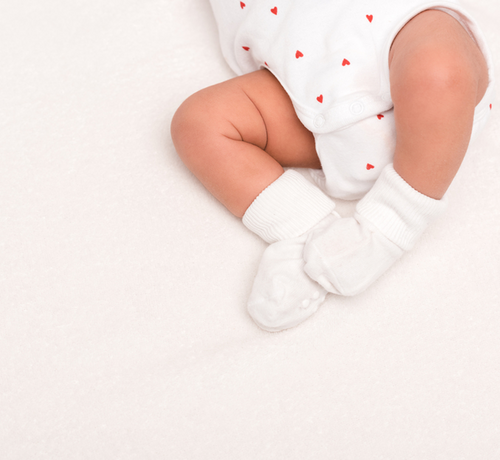As a parent, it’s difficult to watch your sweet baby suffer in any way. It’s especially hard when you don’t know the cause or the solution to their problem.
That’s often the case with baby eczema, also known as atopic dermatitis. There’s no actual cure for eczema, but there are various ways to treat your little one’s skin and manage their symptoms. However, many treatments for eczema are far from natural and gentle.
So how can you avoid exposing your baby to chemicals like bleach baths and other harsh eczema treatments?
If you want to care for your baby’s delicate skin with alternative and natural eczema treatments, you’re in the right place. In this article, the baby experts at Mustela give you 19 of our favorite ways to treat eczema naturally.
Table Of Contents
What Causes Baby Eczema?
In order to decide on a natural eczema treatment, it’s important to first understand what eczema is and some of the potential causes or contributing factors.
While eczema is a common problem (between 10% and 30% of babies and kids suffer from eczema), that doesn’t make it any easier to see your baby with this bothersome condition. Their skin becomes red, rough, itchy, and dry, and it’s difficult to figure out the triggers or to predict a flare-up.

While the exact cause of eczema is unknown, it’s related to genetics, environmental factors, and the immune system. Of course, each little person’s skin is sensitive to different things, but below are some factors that typically make eczema worse.
1) Dry Skin
Eczema is much more than just dry skin, but not properly moisturizing your baby’s skin can make them more likely to have an eczema breakout.
Another factor that contributes to dry skin? The cold, dry air that winter brings. It can quickly zap moisture from your baby’s skin and make eczema worse. Use a humidifier in your baby’s room and apply Stelatopia Emollient Balm regularly to combat the effects of harsh winter air.
2) Irritants
Before they’re even able to walk, your little one comes into contact with several irritants — through the air and through the products that you use to care for your baby and your home.
Dust, air pollution, soap, lotion, laundry detergent, shampoo, and cleaning products are just a few of the items that may irritate your baby’s skin.
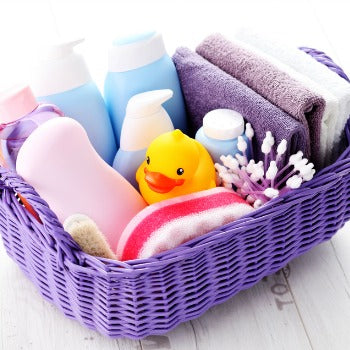
Bath time has always been a source of concern for babies with eczema-prone skin because of all the possible irritants in the water, soap, and shampoo.
You can remove those irritants and make bath time safe and enjoyable again by adding Stelatopia Bath Oil to the water and washing baby’s skin and hair with Stelatopia Cleansing Gel and Stelatopia Foam Shampoo.
3) Heat
Heat is another factor that can worsen the symptoms of eczema. And that doesn’t just include the warmth of the summer sun. Heat could also be caused by too many layers of clothes on your baby’s body.
4) Food
Diet can sometimes contribute to an infant’s eczema. And if you’re breastfeeding, that means that your diet might be the culprit. Food allergies, specifically, can aggravate eczema. But even if your child doesn’t have an actual allergy, certain foods might cause a reaction and contribute to flare-ups.
Here are some common foods that could cause problems:
- Eggs
- Milk
- Soy
- Wheat
- Peanuts
If you think your little one is allergic to something, check with their pediatrician. An allergy test can help determine exactly what you’re dealing with.
5) Gut Health
Gut health is about much more than just your baby’s diet. Having a healthy gut means having the right amount of good bacteria in your digestive system. And gut health contributes to a healthy immune system, which is important in keeping eczema under control.
6) Stress
It’s not just adults who feel the effects of stress. Babies and children can feel it, too. In fact, research shows that stress may contribute to eczema flare-ups in children.
What can you do to reduce stress in your little one’s life? One way is to create a bedtime routine and stick to it as much as possible. A soothing bath, followed by a massage with Stelatopia Emollient Cream, can help your little one relax and prepare for a good night’s sleep.
You can also try staying calm around your baby. Since little ones pick up on the emotions of those around them, managing stress in your own life is essential. That way, you don’t inadvertently transfer it to your baby.
Natural Eczema Treatments
Now that you know a little more about eczema, here are 19 great ways to naturally treat and calm your baby’s eczema-prone skin.
1) Apply Sunflower Seed Oil
What goes on your baby’s skin is important, especially if you’re trying to keep eczema under control. Using sunflower seed oil is a natural way to keep delicate skin moisturized. But it’s more than just great moisturization.
The National Eczema Association says that sunflower oil improves the skin barrier, helping to ward off bacteria, and “serves as an anti-inflammatory, which can be beneficial for patients suffering from the inflammation of eczema.”
2) Use Coconut Oil
Using coconut oil on your baby’s skin is another effective, natural way to treat their eczema. And like sunflower oil, it’s more than just another oil.
The National Eczema Association notes, “One study with atopic dermatitis patients showed staph bacteria on the skin decreased by 95 percent after coconut oil was applied to the skin (as compared to a reduction of about 50 percent in patients who applied olive oil instead).”
To use coconut oil, apply a small amount to your baby’s skin after a bath or whenever you notice their eczema acting up. It's gentle enough to use every day, as long as you ensure your baby isn't allergic to coconuts.

3) Give Your Baby A Soothing Bath
There are several ways to make bath time help — not hurt — your baby’s eczema-prone skin.
First, keep baths short and warm. It’s best if the water temperature doesn’t exceed typical body temperature: 98.6 degrees Fahrenheit. The ideal bathing temperature for babies with sensitive skin is between 97 and 98.6 degrees.
Water that’s too hot and steamy will not only make your baby uncomfortable, but it can also dry out their skin and aggravate eczema. Also, limit baths to 10 minutes so that the water doesn’t dry out their skin even more.
Second, make the bath water work for you, not against you! Use a soothing, natural eczema treatment that can be added straight to the tub. You can add a bath oil (like Mustela Stelatopia Cleansing Oil), baking soda, or colloidal oatmeal.
Third, choose a cleanser, like Stelatopia Cleansing Gel, that won’t irritate your baby’s delicate skin. Stelatopia Cleansing Gel is specifically designed for extremely dry and eczema-prone skin.
The gel/cream hybrid envelops your little one’s skin in a silky, hydrating barrier that protects, moisturizes, replenishes, and soothes itchy red patches.

4) Use Apple Cider Vinegar
Speaking of adding skin-calming elements to baby’s bath water, apple cider vinegar is another natural treatment for babies with eczema. It can help fight infection, reduce inflammation, alleviate itching, and calm skin.
Apple cider vinegar can be diluted and used in your baby’s bath, or you can dilute the vinegar and apply it directly to their skin.
Let the vinegar sit on the skin for a few minutes, then rinse it thoroughly. Because of the high acidity levels, you don't want to leave it on your baby’s delicate skin for too long.
Also, though some people swear by drinking apple cider vinegar to treat eczema, don’t try this treatment with your baby unless you check with their doctor first. The high acidity levels in the vinegar can damage their esophagus.
5) Apply Moisturizer Right After Bath Time
When it comes to moisturizing, the what and the when are both important. Whether you moisturize with sunflower or coconut oil or use a gentle, fragrance-free lotion — like Stelatopia Emollient Cream — when you lather baby’s skin is something to keep in mind.
It’s best to apply moisturizer right after bath time when your little one’s skin is still damp. This keeps their skin from drying out post-bath. You’ll want to use it daily, so your baby’s skin can stay hydrated continually and be less prone to future eczema flare-ups.
You may also want to try our Stelatopia Intense Eczema Relief for soothing flare-ups after bath time. With colloidal oatmeal as the main ingredient, this emollient helps relieve discomfort, itching, and irritation caused by eczema rashes and flare-ups while soothing and restoring skin’s moisture barrier.
6) Keep An Eye On Your Baby’s Diet
As we mentioned earlier, diet could be a contributing factor to your baby’s eczema flare-ups. Some baby eczema improves when certain foods — such as milk, wheat, soy, peanuts, or eggs — are eliminated from their diet.
Ask your pediatrician if eliminating foods would help your baby’s eczema. It may be as easy as getting rid of one of the foods you usually feed your little one. And if you’re still breastfeeding, you’ll be the one to eliminate certain foods from your diet.
And don’t worry, just because a particular food is causing your baby problems now doesn’t mean they’ll never be able to eat it. In many cases, eczema goes away, and your baby can outgrow food allergies.
7) Increase Vitamin D Intake
While heat and sweat can aggravate eczema, for some little ones, eczema actually gets worse in the winter. One possible reason is that without the sunny days, your baby’s vitamin D levels are often lower in the wintertime.
You can give your infant vitamin D supplements even if they’re still breastfeeding or on formula. Talk to your pediatrician about what supplement is best and how much time your baby should spend outside.
8) Take Advantage Of Probiotics
Probiotics improve gut health, immune health, and, often, baby eczema. Your breast milk will provide your little one with much of what they need for good gut health, but you can up your game by taking probiotics yourself and giving probiotics directly to your baby.
Special probiotics are made specifically for little ones, and they’re easy to give. Liquid and powder probiotics are both available, so choose whatever is best for you and baby. Add the probiotic straight to formula or put it in solid food.
Note: Always consult your pediatrician before adding any supplements, like probiotics, to your baby’s diet.
9) Dress Your Baby In Gentle Clothes
Besides bath time and the occasional hour in just their diaper, your baby’s skin is almost always rubbing against their clothes. Putting some thought into how you dress your baby will go a long way toward relieving their eczema symptoms.

Be sure the fabric is soft, breathable, and natural (cotton, linen, or silk, for example). Stay away from synthetic fabrics. These materials might feel extra soft and cuddly, but they’re not eczema-friendly because they don’t let skin breathe, and they don’t absorb sweat the way natural fabrics can.
As important as it is to think about the fabric that is in direct contact with your baby’s delicate skin, you’ll want to be sure that the outer layers are also made of breathable fabric. To keep baby cozy and warm, simply add more layers.
And, of course, keep your baby’s eczema in mind at bedtime as well. Try special eczema pajamas, like Mustela’s Stelatopia Skin Soothing Pajamas, to relieve itching and irritation overnight so your little one can rest easy.
Made from 100% OEKTO-TEX certified cotton and fibers containing all-natural ingredients, these unique pajamas are clinically proven to reduce your little one’s urge to scratch while keeping their skin moisturized and comfortable.
10) Avoid Harsh Chemicals
You might think you need to use strong chemicals and soaps to clean your baby’s skin, but that couldn’t be further from the truth. In fact, harsh chemicals can make things worse for eczema-prone skin.
Instead, choose soaps, detergents, and household products free of fragrances, dyes, and other irritating chemicals. Always take time to read the product labels and do your research. And when in doubt, ask your pediatrician for a recommendation.
11) Be Wary Of The Sun
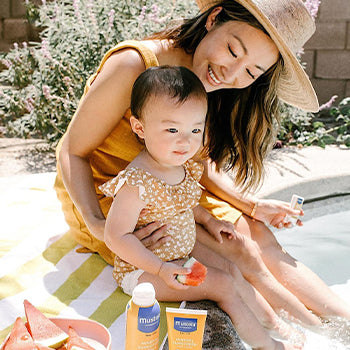
You already know that the sun can damage your skin, but did you know that too much sun exposure can trigger eczema flare-ups? That’s right. The sun’s UV rays can actually make your baby’s eczema worse.
Of course, that doesn’t mean you should keep your little one indoors all day long. Just be sure to take precautions when you do venture outside.
Dress your baby in light, loose-fitting clothes and apply a broad-spectrum sunscreen, such as our SPF 50 Mineral Sunscreen Lotion. And, of course, don’t forget the sunglasses, hat, and umbrella!
12) Use An Ice Pack
An ice pack can help soothe the itchiness and inflammation if your baby has a nasty eczema flare-up. Simply wrap the ice pack in a thin towel or piece of cloth and place it on the affected area for about five minutes at a time.
If you don't have an ice pack, a bag of frozen peas or carrots will work just as well. Just make sure it doesn’t touch your child’s skin directly.
13) Give Your Baby A Massage

A gentle massage can do wonders for your baby’s eczema. It can help relieve their itchiness and also promote relaxation and better sleep. And when your baby is sleeping better, they’re less likely to be stressed.
To give your baby a massage, start by applying a bit of Stelatopia Emollient Cream to their skin. Then, using your fingertips, gently massage the lotion in a circular motion.
Don’t use too much pressure. And be sure to avoid any areas that have broken skin or are bleeding. That way, you don’t accidentally introduce bacteria into their skin and cause an infection.
14) Turn To Colloidal Oatmeal
If you’re looking for a natural way to soothe your baby’s eczema, try colloidal oatmeal. This powder is made from finely ground oats and can help relieve dryness, itchiness, and inflammation.
To use colloidal oatmeal, add a cup or so to your baby’s bathwater. Let them soak for about 10 minutes, then gently pat them dry before moisturizing.
You can also find this powerful, natural ingredient in some skincare products for babies with eczema-prone skin. For example, it's the star in our Stelatopia Intense Eczema Relief. This emollient helps relieve the itch and irritation caused by eczema rashes.
It also restores the skin's moisture barrier, helping to prevent future flare-ups.
15) Run A Humidifier
Dry air can cause dry skin, worsening your child's eczema. If the air inside your home is dry, run a humidifier to add some moisture back into the air. This can especially help during winter when the air is typically drier.
Be sure to clean your humidifier regularly, according to the manufacturer's instructions, to prevent the growth of mold and mildew. Otherwise, this could trigger an asthma attack or cause an even more intense eczema flare.
16) Keep Your Baby Cool
If your baby gets too warm, they'll start sweating. And sweating can irritate eczema-prone skin. Make sure your little one stays cool and comfortable, especially during warmer months.
Dress them in light, breathable clothing made from natural fabrics, like cotton. And avoid using wool or other coarse materials that could irritate their skin.
In addition, keep your baby away from direct heat sources. For example, don't let them sit close to a heater, fireplace, or hot stove. And during the summer months, make sure they stay cool and hydrated, especially if they're spending time outdoors.
17) Minimize Scratching
Eczema itches. There's no getting around that. But if your baby scratches their eczema, it'll only worsen the itchiness. And that can lead to more scratching and more irritation, creating a vicious cycle.
To help your baby avoid scratching their eczema, try these tips:
- Keep their nails trimmed short
- Apply cotton gloves or mittens over their hands
- Lock in moisture with a thick cream
- Wrap your child’s eczema patches with wet wraps
- Use a soft stuffed animal or doll for them to cuddle with instead of scratching
If your baby still has trouble not scratching, talk to their doctor. It may be time to try a pharmaceutical-grade barrier cream or oral medication to help relieve the itch and reduce the chances of an infection.
18) Remove The Carpet

If you have carpet in your home, it may be time to take it out. While remodeling with a baby may not sound fun, this upgrade can help.
Carpet can be a breeding ground for dust mites and other allergens, which can trigger an eczema flare. Therefore, hardwood floors are a better option for families impacted by this skin condition.
But if you're not ready to complete this project, ensure you regularly vacuum with a HEPA filter as this can remove allergens and other irritants from your carpet. You may also want to consider using an air purifier in your home to get rid of dust and other particles in the air.
19) Apply Aloe Vera
Aloe vera is a plant with many healing properties. It's often used to soothe sunburns but can also help treat eczema. That’s because the plant contains compounds that help reduce inflammation and itching.
To use aloe vera for eczema, break off a piece of the plant and apply the gel directly to your child's skin. You can also find aloe vera products over-the-counter at most drugstores.
Treat Your Baby’s Eczema, Naturally

Now that you know some of the best natural and alternative treatments for your baby’s eczema, you’re ready to talk to your pediatrician and come up with a plan for soothing your baby’s irritated skin.
Start by choosing the right moisturizers, ramping up your bath-time game with Stelatopia Cleansing Gel, examining diet and vitamin intake, and trying soft, natural clothes. Hopefully, you’ll be a few steps closer to getting the upper hand on your baby’s eczema.

